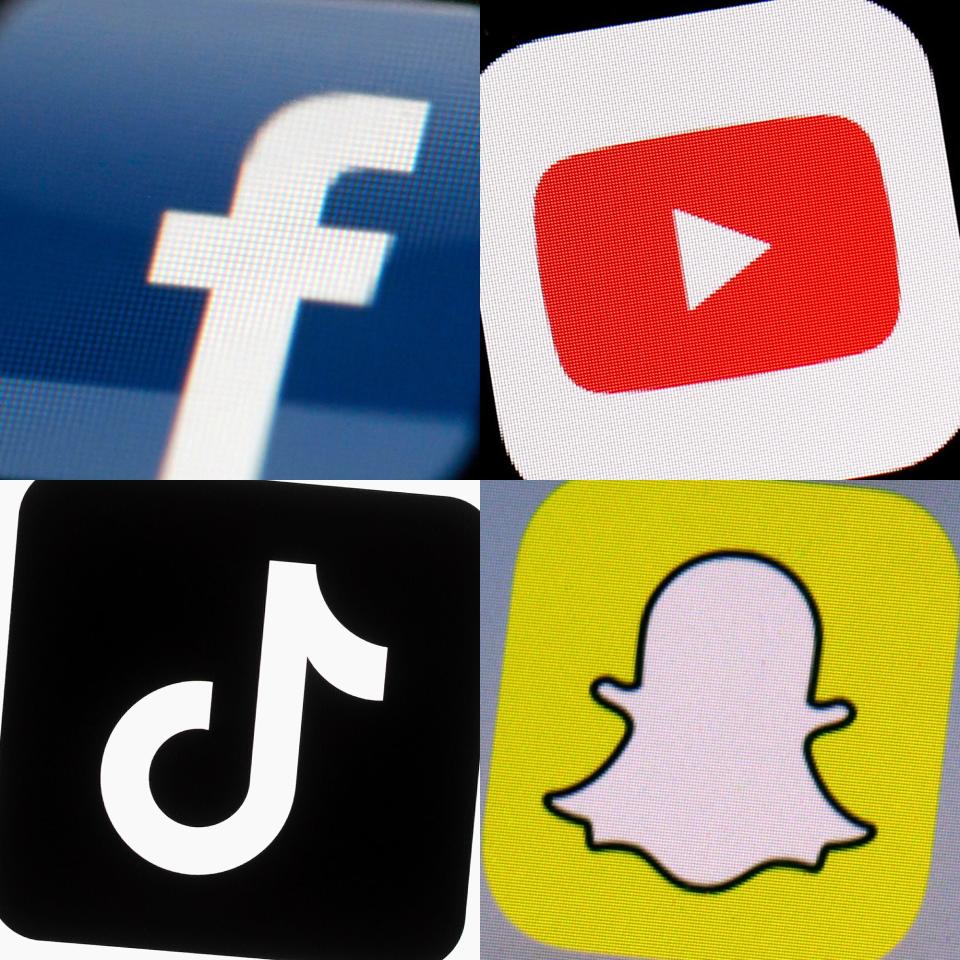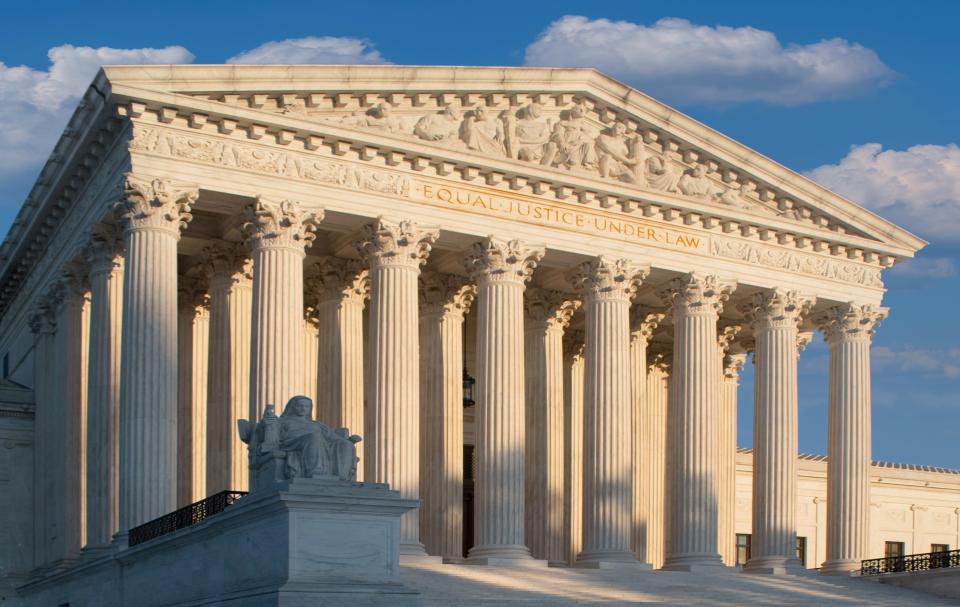Supreme Court readies for major social media free speech battle: Here are the stakes
WASHINGTON ? A half-century after the Supreme Court said no government can dictate what newspapers may publish, the high court will consider whether Texas and Florida can tell social media giants how to operate.
On Monday, the Supreme Court will debate the fate of laws passed by those states to limit the ability of social media giants such as Facebook, YouTube and X to moderate content. Republican lawmakers in Texas and Florida argue that social media companies have been too quick to throttle conservative viewpoints.
The trade groups representing the nation's social media companies, as well as the Justice Department, say the Supreme Court should strike down the state laws because they are an infringement on the companies' First Amendment right to free speech, consistent with the court's 1974 ruling that Florida couldn’t require a newspaper to publish replies to editorials.
“Just as the government may not tell the Miami Herald which editorials to publish or MSNBC which interviews to broadcast, the government may not tell Facebook or YouTube which third-party speech to disseminate or how to disseminate it,” lawyers for the trade associations NetChoice and the Computer & Communications Industry Association wrote in a filing.
But Florida and Texas say social media platforms are less like newspapers and more like telephone and telegraph operators who are transmitting content generated by customers, not creating it themselves.
“The telephone company, internet service provider, and delivery company can all be prevented from squelching or discriminating against the speech they carry,” Florida’s lawyers have told the court. “And so can the platforms.”
A three-judge panel of the U.S. Court of Appeals for the 11th Circuit blocked enforcement of most of Florida's law in 2022. But the New Orleans-based U.S. Court of Appeals for the 5th Circuit upheld the similar Texas law. That created a split in how appeals courts are interpreting the laws.
At the moment, neither the Florida nor the Texas law are in effect while the high court reviews them.
Mask mandates? Supreme Court rejects appeal from Marjorie Taylor Greene, GOP lawmakers

Multiple social media cases before the Supreme Court
The case is just one of three the justices will decide in the next few months with potentially enormous consequences for the way Americans interact on the internet.
The justices will hear arguments next month about whether officials in the White House and federal agencies violated the First Amendment when they leaned on social media companies to suppress what they considered misinformation about the election and COVID-19.
And they’re considering whether public officials may block individual users from following their social media accounts.
The decision by Twitter and other major platforms to suspend former President Donald Trump from their sites after the Jan. 6 attack on the U.S. Capitol was one of the motivations behind the Florida and Texas laws.
“Recognizing that a small number of modern communications platforms effectively control access to vast swaths of our nation’s public discourse, Texas recently barred those platforms from discriminating against their customers on the basis of geography, association or viewpoint,” the state’s lawyers told the Supreme Court in a filing.
Trump among those hoping to sway the court
Trump himself was one of the dozens of outside individuals and groups submitting briefs in hopes of influencing the outcome.
“Trump has a direct interest in upholding these statutes,” his lawyers wrote.
Because of the “unprecedented control” social media giants have over public debate, states have the authority to protect its citizens “from abuse of that immense power,” Republican attorneys general from 19 states said in a filing supporting Florida and Texas.
Liberal groups have weighed in on the other side, fearing the laws will pollute online communities with “extremist” content.
“These laws are aimed at curtailing the proliferation of progressive ideologies online, while at the same time bolstering the same hateful and discriminatory messaging that Texas and Florida have proudly emboldened,” said Jess Miers, a lawyer with Chamber of Progress, an industry-aligned group.
A group of national security experts told the court the laws would significantly restrict the ability of social media platforms to block content posted by terrorists, violent domestic extremists and other bad actors.
Defending editorial judgments
The online review site Yelp said it doesn't have the same "political baggage" of the large social media companies but would still be adversely affected. Under the Texas and Florida statutes, Yelp may no longer be able to recommend the most reliable and useful reviews, frustrating consumers who could give up on the site, according to Yelp's filing.
The U.S. Chamber of Commerce ? usually an ally of Republicans ? said the laws will chill commerce on social media, because editorial judgements are necessary to create environments that will attract users and advertisers.
“Content moderation effectively is the product,” said Ari Cohn, an attorney at the think tank TechFreedom. “They are curating an experience for their users. They are just not simple transmitters of indiscriminate pieces of information from point A to point B.”
Facebook regularly removes millions of items it considers bullying or harassment, as well as “hate speech content,” according to court filings.
YouTube bans pornography along with violent or graphic content.
“Given the cacophony of voices on the Internet engaged in everything from incitement and obscenity to political discourse and friendly banter, websites like Facebook and YouTube have no realistic choice but to exercise editorial discretion over the expression they disseminate,” the trade groups told the court. “Their users and advertisers demand nothing less.”

'Paralyzingly burdensome' or 'not difficult'?
The trade associations also argue that the laws’ requirement that platforms provide individualized explanations to a user for removing or altering a post would be “paralyzingly burdensome,” and akin to making a newspaper explain every decision not to publish any one of a million letters to the editor.
Florida shot back that if the platforms have the technological capability to review and remove millions of posts a day, they should be able to disclose and explain those actions. If they don’t, the platforms could be sued for up to $100,000 for each violation under the state’s law.
“It is not difficult to tell a user that the platform has removed the user’s content or why,” Texas’ lawyers said in defending their law, which requires an appeals process if content is blocked.
The Justice Department, which will be arguing alongside the social media sites Monday in asking the Supreme Court to strike down the state laws, said there are ways to regulate the sites that don’t violate the First Amendment. These laws just aren’t among them, they've told the court.
A decision in the case is expected by the end of June.
Impact: How the Supreme Court could alter the way Americans interact on the internet
This article originally appeared on USA TODAY: How a Supreme Court social media case could alter life online
